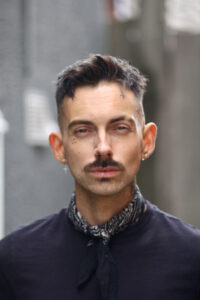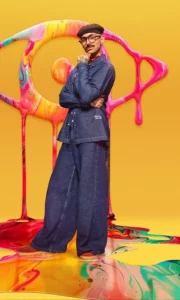Big Brother contestant Dean tells his story of loss and resilience after losing his step mum to breast cancer

She was the light in the room. She never judged anyone for who they were. She literally accepted everyone as they were. She was such a big music lover as well, we bonded over music. She was like a gay man in a woman’s body. She was always laughing, always smiling. She just loved to have fun.
I first heard about here cancer from my dad. My brothers and I kind of always knew she wasn’t well, but my dad would never say what it was. We were quite young at the time; I was about 14 or 15, my brothers were probably about 9 or 10. I think my dad tried to keep it away from us as long as possible and didn’t want to scare us. I think when the breast cancer became more prominent, he had to tell us.
We were in a Morrison’s car park after shopping, and he just said, “Lyd’s sick again.” I didn’t pay too much attention at first. Then he said she’s been diagnosed with breast cancer and it had come back – that’s when we tweaked this had happened before.
At that age, I didn’t really understand what cancer meant. I just assumed she would die. It was quite a scary thing. She never let it bother her, when we were with her at weekends, she would be just like normal. I could tell she was slowing down, and though I didn’t know that at the time, she was probably going through treatment then.
I was in my twenties when the illness returned. My dad told me she was unwell again and would need to undergo treatment. I felt concerned, but he reassured me that she would be alright. We continued visiting them on weekends, and at first, she seemed to be doing okay. But when the treatment began and she started losing her hair, it really hit me – this was serious.
She went through treatment, the hair came back and although she was still very sick, she had a period of time where she seemed OK again. However she was going in and out of hospital a lot more, but my Dad hid that from us. Even in our 20s, he didn’t want to scare us.
One morning I called my Dad, as I could feel that something wasn’t right. He said he was at the hospital, Lyd was back in. I called in sick at work and I went to the hospital, and that was the first time I’d seen her really sick.
“She spent around six months in hospital, and we visited her all the time. My dad was there every single day, and my younger brothers – her sons – were always by her side. Eventually, she was moved to a Macmillan facility near the hospital. Later, we were told she could come home. At that stage, her care was focused on prolonging her life, though no one explained that to us directly – understandably, it’s not something you want to tell your kids.
One day, I saw her, and she couldn’t talk. Her eyes were closed, and she’d lost so much weight as well. She was like a different person. I called my brothers to come to the hospital. I didn’t think she had long left.
Everyone came up to the hospital. My Dad wondered why everyone was there. He was used to her bouncing back but in the space of a week or two she had got worse. They were giving her morphine and they had moved her to a separate room.

It was very quick from then. She was in a lot of pain. I remember her calling out for me. I sat with her and held her hand, and she said “please help me.” I didn’t know what to do. The nurses came in and gave her something to make her comfortable. They induced her and she peacefully passed within minutes. It was intense. Seeing it happen stays with you for life.
It was a rough time. The hardest part is the aftermath. No one talks about how it affects everyone else. It’s weird because I was glad she wasn’t in pain anymore but also, you don’t want her to not be there, especially for my Dad. He wouldn’t go anywhere without her, they were each other’s person.
Memories of her laughter got me through the tough times. I know it sounds weird but our family get through things with humour. We have a really sad time, we cry and let it out, but then there’s times where we’d say “if Lyd was here, this is what she’d be saying.”
I think the strangest moment was leaving the hospital after she’d passed. Her favourite song was Jennifer Hudson’s ‘Spotlight’. She would always play it when she used to pick us up. It came on and we all got really emotion. I think that was her way of saying thank you for being there.
You don’t ever get over it. You just continue, but you just stick together as a family. We were there for my Dad, and my brothers lived at home at the time and they were there with him. I was there from morning to night, if they needed anything. I think as the oldest, I didn’t really have time to grieve or process it because I was the person that had to keep everyone together.
My brothers and my Dad were offered support, not through the hospital, more from school for my brothers, but nothing from the NHS. I think that’s a really big thing that’s missed, especially for the children and the other half of the deceased. No one ever really talks about these things. It’s hard because I think we need that.
Men are expected to not be emotion and not open up and just get on with it. My Dad’s side of the family is Romani Gypsy. The culture is very much ‘men don’t cry’. I’d never seen my Dad cry until she died and even then he tried to hide it. He had some more support later on. I think if he had had that initially, it would have helped his grieving a lot more.
My brothers struggled too and didn’t get counselling until they took it up on themselves. My little brother was only 14 or 15 when she passed. They were very close. His mental health was bad. My other brother doesn’t really show emotion, like my dad. He’s still never really spoken about it, at least not with me.
If support had been offered immediately, I think all of us would have said yes, but there wasn’t enough of that.

I will still talk to her as if she’s here. Especially when I did Big Brother. I just knew she was there with me. I was up for eviction the first week. I remember speaking to her “if you are watching, look after me.” And then, the night before I got evicted, I had a dream that she was there. She held my hand and she took me out of the house. I was so anxious before it. Then, when it happened, I knew I was OK, I knew that she was going to be with me.
I’m a spiritual person. I believe people go somewhere else and they’re still around us in some form. I’ve seen so many people pass and they’ve said on their deathbed that someone’s here to get me. That’s not a coincidence. My dad’s spiritual as well. I think that was his way of processing it. I think he still talks to her too, I think that’s how we honour her.
I would say to any men that are going through it, that feel like they’ve got no support or they’re on their own – grieve how you want to grieve, there’s no right or wrong way. If you want to cry, cry. If you want to laugh, laugh. If you want to speak about it, speak about it. Don’t hide it, because that will only make your mental health worse.
To anyone that is against therapy or talking to someone, do it. I know it’s hard opening up to a stranger but they are there to listen and they can give you ways of coping. Don’t cry and then just get on with it, because in the long run that will mess you up mentally and physically. It’s going to it’s going to play on your mind.
When I signed with my agency, I said I’d love to work with cancer charities or queer charities, to spread awareness. Hearing about the ‘Don’t Forget the Men’ like campaign was incredible. This is something I definitely want to be like involved with. I was all over it.